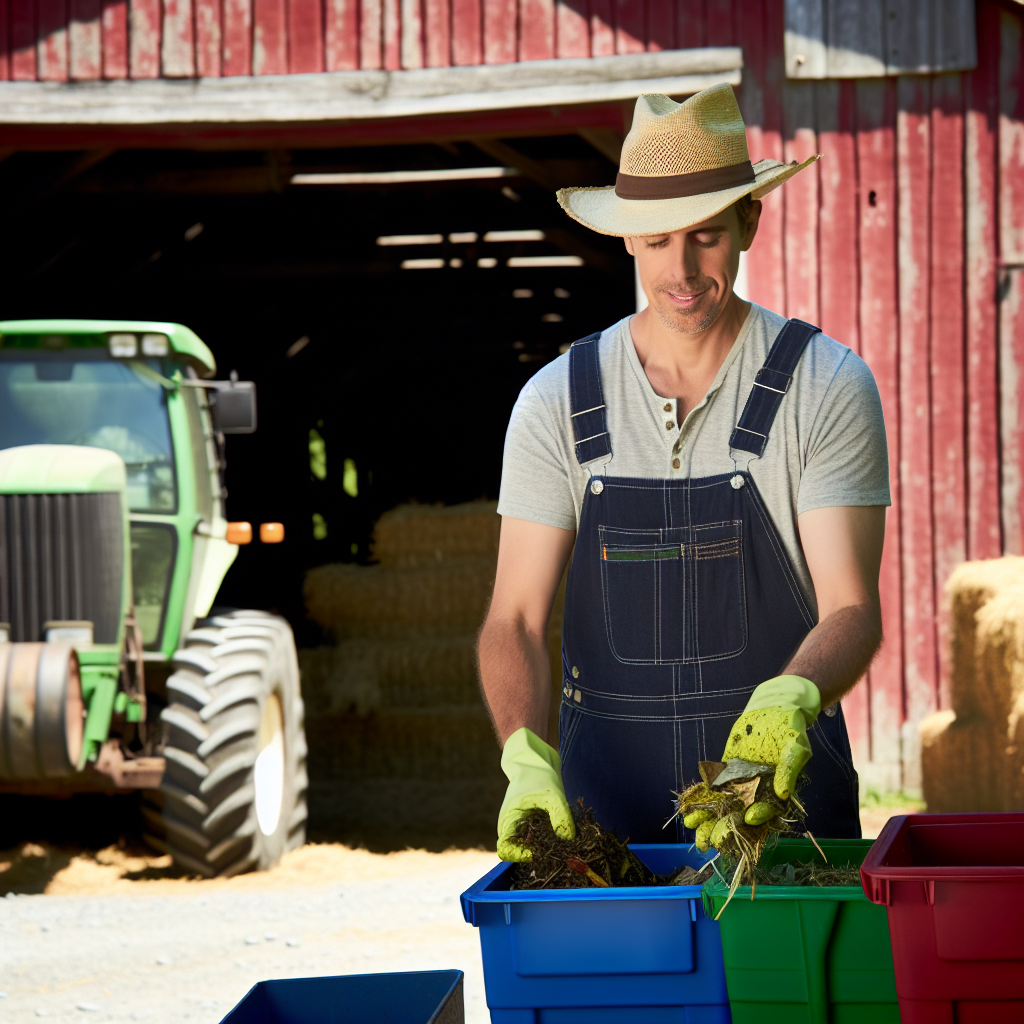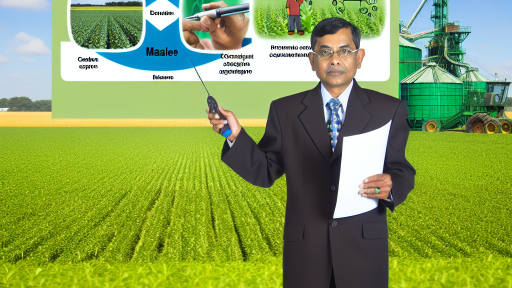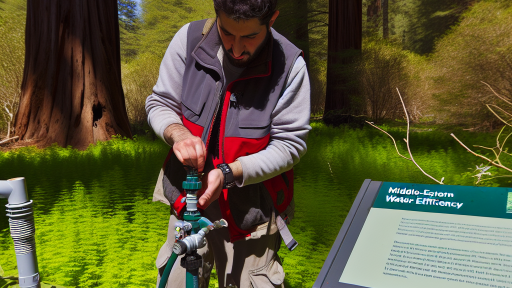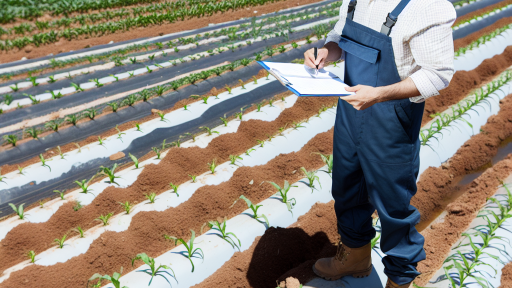Introduction to Farm Byproducts
Definition and Overview
Farm byproducts refer to materials generated during agricultural production.
These materials often include leftover plant matter, animal waste, and unused portions of crops.
Farmers typically view these byproducts as waste.
However, these byproducts hold significant potential for recycling and reuse.
By acknowledging their value, farmers can turn waste into resources.
Importance of Farm Byproduct Recycling
Recycling farm byproducts benefits both the environment and the economy.
It reduces the amount of waste sent to landfills.
This process also lessens pollution and greenhouse gas emissions.
Moreover, it fosters sustainable farming practices.
Additionally, farmers can save costs by recycling inputs instead of purchasing new ones.
Types of Farm Byproducts
Various types of farm byproducts exist across different agricultural sectors.
Agricultural byproducts include crop residues, such as straw and husks.
Livestock farms produce manure and bedding materials.
Food processing yields byproducts like pulp and waste trim.
Understanding these types helps in identifying recycling opportunities.
Transform Your Agribusiness
Unlock your farm's potential with expert advice tailored to your needs. Get actionable steps that drive real results.
Get StartedCurrent Practices in Byproduct Recycling
Farmers implement multiple practices to recycle byproducts effectively.
- Composting organic materials enriches soil health.
- Using anaerobic digestion converts manure into biogas.
- Mulching crop residues protects soil and promotes water retention.
These practices highlight the innovative approaches farmers take to enhance sustainability.
Challenges in Byproduct Recycling
Despite the benefits, challenges exist in byproduct recycling.
One significant barrier is the lack of proper infrastructure.
Additionally, farmers may face economic constraints.
Limited market demand for certain recycled products also creates difficulties.
Overcoming these challenges requires support and collaboration across sectors.
Future Directions in Farm Byproduct Recycling
The future of farm byproduct recycling looks promising.
Emerging technologies can improve recycling efficiency.
Education and training programs will empower farmers to adopt new practices.
Moreover, increasing public awareness can boost demand for recycled products.
Collaborative initiatives may lead to innovative solutions.
Environmental Impact of Farm Byproducts
Understanding Farm Byproducts
Farm byproducts include organic materials generated during agricultural production.
These materials can often end up in landfills, creating environmental burdens.
However, with proper management, they can serve productive purposes.
For instance, byproducts can be recycled or repurposed in sustainable ways.
Negative Environmental Effects
Dumping farm byproducts contributes to soil and water contamination.
Decomposing organic waste emits greenhouse gases like methane.
Moreover, it exacerbates climate change and affects local ecosystems.
Farmers should recognize these impacts to adopt better practices.
Benefits of Recycling Byproducts
Recycling farm byproducts offers numerous environmental advantages.
First, it reduces waste headed for landfills, conserving space and resources.
Second, repurposing organic materials can enrich soil health.
This practice leads to improved crop yields over time.
Showcase Your Farming Business
Publish your professional farming services profile on our blog for a one-time fee of $200 and reach a dedicated audience of farmers and agribusiness owners.
Publish Your ProfileFurthermore, recycling can minimize emissions compared to disposal.
Examples of Sustainable Practices
Farmers can implement composting as a sustainable recycling method.
This process transforms organic waste into nutrient-rich fertilizer.
Additionally, anaerobic digestion can convert byproducts into biogas.
This renewable energy source reduces reliance on fossil fuels.
Both methods demonstrate effective waste management strategies.
Implementing Sustainable Solutions
To implement these practices, farmers should first assess their byproducts.
Identifying recyclable materials is crucial for creating a plan.
Next, farmers can seek partnerships with organizations focused on waste management.
By collaborating, they can enhance resource efficiency and sustainability.
Encouraging Innovation
Lastly, innovation plays a vital role in advancing sustainable recycling.
New technologies can optimize the processing of farm byproducts.
Moreover, educational programs can raise awareness about sustainable practices.
Farmers should invest in learning opportunities to adopt best practices.
Economic Benefits of Recycling Farm Byproducts
Reduction of Waste Disposal Costs
Recycling farm byproducts significantly decreases waste disposal expenses.
This reduction benefits farmers looking to optimize their budgets.
Instead of paying for landfill fees, they can repurpose materials.
Consequently, farmers find ways to utilize every part of their produce.
Creation of Value-Added Products
Recycling leads to the development of new, value-added products.
For example, using husks from crops can create biodegradable packaging.
These products have growing market demand due to sustainability trends.
Additionally, farmers can command higher prices for these innovative goods.
Enhanced Soil Health and Productivity
Recycling organic byproducts improves soil health significantly.
When farmers compost these byproducts, they enrich the soil.
This practice leads to increased crop yields and better quality produce.
Enhanced soil also requires fewer chemical fertilizers, lowering costs.
Access to New Markets
Farmers who recycle byproducts tap into new markets.
They can sell fertilizers or animal feed made from recycling processes.
Additionally, selling recycled materials can attract eco-conscious consumers.
These markets are expanding as sustainability considerations grow.
Increased Government Incentives
Many governments offer incentives for recycling practices.
Farmers can benefit from financial assistance and tax breaks.
These programs encourage sustainable practices among agricultural producers.
As a result, farmers can invest savings into further improvements.
Community Support and Brand Loyalty
Farmers who engage in recycling gain community support.
Local consumers often prefer products from eco-friendly producers.
This loyalty translates to repeat customers and positive word-of-mouth.
Moreover, such practices can enhance the farm’s reputation.
Learn More: Drought-Resistant Crop Selection for Water Savings
Methods of Farm Byproduct Recycling
Composting
Composting is an effective method for recycling farm byproducts.
Showcase Your Farming Business
Publish your professional farming services profile on our blog for a one-time fee of $200 and reach a dedicated audience of farmers and agribusiness owners.
Publish Your ProfileThis process converts organic waste into nutrient-rich compost.
Farmers can use compost to enhance soil fertility.
Additionally, composting reduces landfill waste significantly.
Farmers can compost crop residues, manure, and food waste.
Furthermore, composting supports sustainable farming practices.
Anaerobic Digestion
Anaerobic digestion is another valuable recycling technique.
This process breaks down organic matter without oxygen.
It produces biogas, which can be utilized for energy.
Farmers can use biogas to power machinery or generate electricity.
Additionally, anaerobic digestion reduces greenhouse gas emissions.
Digestate, the end product, serves as an effective fertilizer.
Bioenergy Production
Bioenergy production utilizes farm byproducts for renewable energy.
Farmers can convert agricultural waste into biofuels or heat.
This process helps reduce dependence on fossil fuels.
Moreover, bioenergy contributes to rural economic development.
Farmers can partner with energy companies to optimize production.
By investing in bioenergy, farmers engage in sustainable practices.
Learn More: Agroforestry Planning And Design For Sustainable Farms
Case Studies of Successful Farm Byproduct Recycling Initiatives
Innovative Composting Practices
Green Valley Farms has adopted innovative composting practices to recycle livestock waste.
This method not only reduces waste but also enriches soil health.
Farmers spread the compost on fields, enhancing crop yields significantly.
Moreover, they have reported reduced fertilizer costs as a result.
Utilization of Organic Biomass
Sunny Acres Orchards showcases effective utilization of organic biomass from fruit processing.
They convert apple cores and peels into nutritious animal feed.
By doing this, they decrease waste and lower feed costs.
Furthermore, they ensure that their livestock receive high-quality nutrition.
Energy Production from Byproducts
EcoFarms Energy Solutions illustrates how to produce energy from agricultural byproducts.
They convert crop residues into biogas for electricity generation.
This initiative minimizes reliance on fossil fuels while promoting sustainability.
Additionally, it creates a closed-loop system that benefits the farm.
Educational Outreach and Community Involvement
Heartland Farmers Cooperative engages in educational outreach regarding byproduct recycling.
They offer workshops to local farmers on best practices.
This initiative fosters community involvement and boosts knowledge sharing.
Consequently, more farms are adopting sustainable practices, enhancing regional environmental health.
Partnerships with Local Composting Centers
Riverside Agricultural Group partners with local composting centers effectively.
They deliver crop residues that are composted for community use.
This collaboration promotes sustainable waste management on a broader scale.
It creates a win-win situation for both farmers and local residents.
Gain More Insights: Conservation Tillage Practices For Small Farms
Innovative Technologies in Byproduct Recycling
Introduction to Innovative Technologies
Innovative technologies can transform farm byproducts into valuable resources.
Showcase Your Farming Business
Publish your professional farming services profile on our blog for a one-time fee of $200 and reach a dedicated audience of farmers and agribusiness owners.
Publish Your ProfileThese technologies promise to enhance sustainability in agriculture.
Moreover, they can reduce waste and lower operational costs.
Bioconversion Techniques
Bioconversion involves using microorganisms to convert organic byproducts into usable forms.
For example, anaerobic digestion can produce biogas from manure.
This biogas can then be used to generate electricity or heat.
Additionally, this process reduces greenhouse gas emissions significantly.
Waste-to-Energy Solutions
Transforming agricultural waste into energy is a growing trend.
Farmers can utilize biomass gasification technologies effectively.
These systems convert organic materials into syngas, a clean fuel source.
This process not only utilizes waste but also provides renewable energy.
Advanced Composting Techniques
Composting is evolving with advanced methodologies and technologies.
Aerated static pile composting improves efficiency in breaking down organic waste.
This method enhances microbial activity, speeding up the composting process.
As a result, farmers produce high-quality compost faster and more sustainably.
The Role of Precision Agriculture
Precision agriculture integrates advanced technology into farming practices.
It allows for targeted application of byproducts in a data-driven manner.
This optimization minimizes waste while maximizing productivity.
Farmers can utilize sensor technology to monitor soil health and crop needs.
Collaboration and Knowledge Sharing
Partnerships between farmers and tech companies drive innovation.
For instance, companies like GreenTech Innovations foster collaboration.
These partnerships focus on developing new recycling technologies.
Additionally, knowledge-sharing platforms aid in disseminating best practices.
Future Perspectives in Agriculture Recycling
Innovative technologies promise to redefine how the agriculture industry handles waste.
By adopting these methods, farmers can improve efficiency and sustainability.
Ultimately, these technologies will help meet the growing global food demands.
Uncover the Details: Top Recycling Practices for Sustainable Agriculture

Challenges and Barriers to Farm Byproduct Recycling
Understanding the Landscape
Farm byproduct recycling faces numerous challenges across various agricultural sectors.
These challenges often stem from economic, logistical, and regulatory factors.
Additionally, some farmers may lack awareness about the benefits of recycling.
Economic Constraints
Financial limitations pose a significant barrier to effective byproduct recycling.
Many farmers operate on tight margins, limiting their ability to invest in recycling technologies.
Moreover, the cost of transporting byproducts can exceed potential recycling revenues.
Consequently, many farmers opt for disposal rather than recycling solutions.
Logistical Issues
Logistical challenges complicate the recycling process for farmers.
For instance, the diverse types of agricultural byproducts create handling complexities.
Moreover, inconsistent supply chains make it difficult to ensure reliable recycling outcomes.
Furthermore, limited access to appropriate facilities hampers recycling efforts.
Regulatory Barriers
Regulations can significantly hinder farm byproduct recycling initiatives.
Strict compliance requirements may deter farmers from pursuing recycling options.
Moreover, differing regulations across regions can confuse farmers about proper practices.
Showcase Your Farming Business
Publish your professional farming services profile on our blog for a one-time fee of $200 and reach a dedicated audience of farmers and agribusiness owners.
Publish Your ProfileSuch regulatory challenges often lead to uncertainty and discourage participation in recycling programs.
Acknowledging the Knowledge Gap
Many farmers lack understanding of the benefits associated with byproduct recycling.
This knowledge gap can result from inadequate educational resources or outreach programs.
Additionally, without training, farmers may struggle to implement effective recycling methods.
As a result, misinformation may lead to missed opportunities for sustainable practices.
Navigating Cultural Attitudes
Cultural perceptions can also influence recycling efforts on farms.
Some farmers may view byproducts as waste rather than a resource.
This mindset prevents them from exploring innovative recycling solutions.
Consequently, shifting perspectives becomes essential for increasing recycling success.
Regulatory Framework and Support for Sustainable Practices
Introduction to Regulations
Regulations play a crucial role in promoting sustainable farming practices.
They set standards that farms must meet to minimize environmental impacts.
Moreover, regulations help ensure the safe recycling of byproducts.
Key Regulatory Bodies
Several key organizations govern agricultural practices.
The U.S. Environmental Protection Agency oversees environmental compliance.
The U.S. Department of Agriculture provides guidelines for sustainable practices.
Additionally, local regulatory agencies enforce regional policies.
Support Programs for Farmers
Various support programs assist farmers in adopting sustainable practices.
These programs provide financial incentives for recycling byproducts.
Non-profit organizations often offer workshops and training sessions.
Such programs aim to increase awareness and knowledge among farmers.
Importance of Compliance
Compliance with regulations promotes environmental stewardship.
Farmers who adhere to guidelines contribute to sustainable development.
Furthermore, compliance can enhance a farm’s marketability.
Consumers are increasingly seeking environmentally friendly products.
Challenges in Implementation
Despite the benefits, many farmers face challenges with regulations.
Regulatory complexity can overwhelm smaller farms.
Additionally, financial constraints may hinder compliance with new standards.
Support networks are essential to help farmers navigate these issues.
Future Trends in Regulation
Future regulations are likely to focus on climate change mitigation.
Encouraging agroecological methods will become increasingly important.
Moreover, there is a growing emphasis on reducing waste and emissions.
Innovative technologies will likely emerge to support these goals.
Future Trends in Sustainable Farm Byproduct Management
Innovative Recycling Techniques
Farmers adopt innovative recycling techniques for their byproducts.
For instance, anaerobic digestion can convert manure into energy.
This process reduces greenhouse gas emissions and produces biogas.
Moreover, composting organic waste enriches soil health and fertility.
Such techniques enhance sustainability on farms while creating new revenue streams.
Circular Economy Practices
The concept of a circular economy is gaining traction in agriculture.
Farmers aim to minimize waste through effective byproduct utilization.
For example, crop residues can serve as animal feed or bedding.
Showcase Your Farming Business
Publish your professional farming services profile on our blog for a one-time fee of $200 and reach a dedicated audience of farmers and agribusiness owners.
Publish Your ProfileThey can also be transformed into biochar, improving soil structure.
Circular economy practices promote resource efficiency and reduce environmental impact.
Technological Integration
Technology plays a crucial role in farm byproduct management.
IoT devices help monitor waste production in real-time.
This data enables farmers to optimize byproduct recycling strategies.
Additionally, software solutions facilitate the tracking of byproducts for better planning.
Overall, technological integration enhances efficiency in sustainable practices.
Collaboration and Knowledge Sharing
Collaboration among farmers, researchers, and organizations fosters innovation.
Knowledge sharing helps implement best practices in byproduct management.
Workshops and seminars educate farmers about sustainable solutions.
Networking opportunities encourage partnerships for research and development.
Consequently, collective efforts drive progress in sustainable agriculture.
Policy Support and Incentives
Government policies can significantly impact farm byproduct recycling.
Incentives for adopting sustainable practices encourage farmer participation.
For instance, grants for developing biogas facilities are beneficial.
Regulatory frameworks must also support waste reduction initiatives.
Ultimately, supportive policies pave the way for sustainable agriculture growth.




